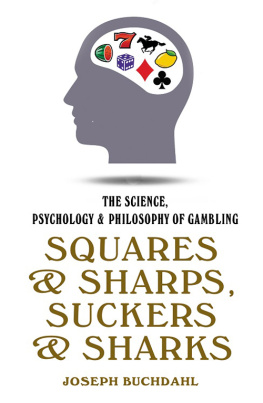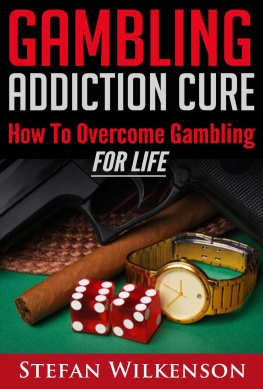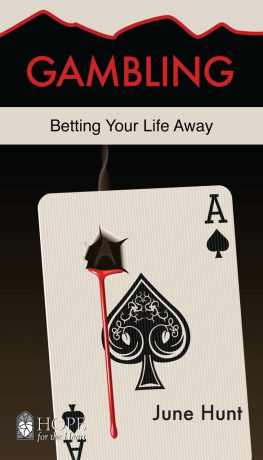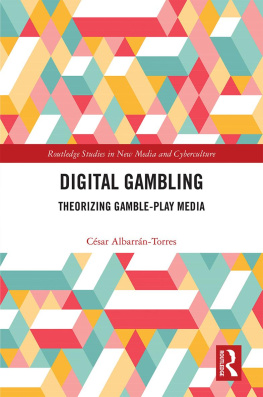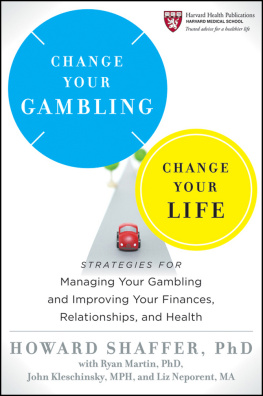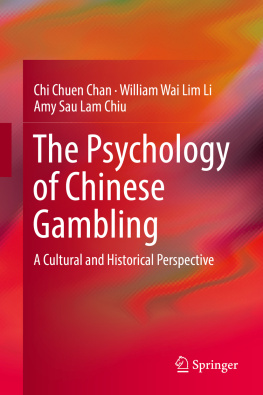

SQUARES & SHARPS,
SUCKERS & SHARKS
People have been gambling, in one form or another, for as long as history itself. Why? Money, entertainment, escape and a desire to win are all traditional explanations. Arguably, however, these are secondary considerations to a higher order purpose: a craving for control. Gambling offers a means of gaining authority over the unknown, granting us a sense of control over uncertainty. Almost always that sense is illusionary gambling, including betting and investing, is essentially random yet for many it is nonetheless profoundly rewarding. This book attempts to explore the reasons why. Along the way, it examines:
The science of probability and uncertainty
Why gambling is often condemned
The difference between expectation and utility
The irrationality of human beings
Evolutionary perspectives on gambling
Luck and skill
Market efficiency and the wisdom of crowds
Why winners take all
Cheating
Why the process matters more than the outcome
Since 2001 Joseph Buchdahl has been providing quantitative football and tennis data for betting analysis, and independent verification for sports betting advisory services. He is also the author of Fixed Odds Sports Betting and How to Find a Black Cat in a Coal Cellar.
Contents
Albert Einstein once famously said that God does not play dice, expressing his contempt for the idea that the universe is governed by probability and believing instead that everything is causally deterministic. According to 19th century determinism, if someone could know the precise location and momentum of every atom in the universe, their past and future values for any given time could then be calculated from the laws of classical mechanics. Laplaces Demon, as this thought experiment became known, has provided the beacon of hope to all gamblers that it is fundamentally possible to predict the future. Sadly, quantum mechanics, the science of the 20th century, demonstrated that both Einstein and Laplace were wrong. Not only does God play dice, but he doesnt know what the outcome will be.
The quantum mechanical world of the atom may not, at first sight, have a great deal to do with the spin of a roulette wheel, predicting the outcome of a football match or the value of a share, although more than one might imagine, as we shall see. Yet the significance of the distinction between these two ideas of determinism and uncertainty lie at the very heart of understanding the science of gambling and the psychology of gamblers. Human beings love to find patterns; indeed, theyve evolved that way (because pattern recognition is cognitively less energy-intensive). And they love to find causal explanations for those patterns, even when none actually exists. Randomness, by contrast, is not a concept easily understood and embraced, but failure to do so ensures that the majority of gamblers, including even those in the arenas of sports and finance where theoretical advantages exist, find themselves on the wrong side of the profit line. Furthermore, almost all of those who do make money from such gambling markets do so purely by chance.
This is not an idea that most gamblers find palatable, since it has implications for the very reasons why we choose to gamble in the first place. Gambling is connected to an intrinsic desire to control ones destiny, to manipulate luck in order to validate and find meaning in life. Gambling, it turns out, is as natural as a faith in God, and for more or less the same reasons. No wonder, then, that those of a more religious persuasion, both past and present, have attempted to condemn it as something immoral. If all (or almost all) of gambling, including sports betting and financial investing, is just uncontrollable chance, what, then, is the point of it?
Spoiler alert: this book will not provide you with a winning system. On the contrary, having read it you will understand why, if I had made such a claim, it would probably no longer be valid. My intention, then, is not to help you become a more profitable gambler but rather, hopefully, a wiser one, through a deconstruction of three core areas associated with gambling: its science, psychology and philosophy. In doing so I hope to explore the reasons why some of us gamble, why others condemn it, why still others exploit it for selfish intentions, why most of us lose whilst a few winners take all, and finally why gambling, or at least the way some gamblers think, might actually be good for our decision making.
Whilst I will be examining various domains of gambling, including games of pure chance (at the casino) as well as games that theoretically offer an element of skill (poker, sports and the world of finance), my background as a sports data analyst predicates that much of my material will focus on betting. In particular, I will be using data that I have collected over the past 14 years to investigate why so few sharps actually manage to beat the market, and why the remaining squares are really just randomly chucking darts. Following this, I will also review a few examples of the shady practices that take place in the world of gambling, exploring some of the reasons why sharks might choose to prey on suckers and why the latter allow themselves to fall victim. Finally, I will conclude by examining what makes a good gambler, and why when faced with decision making under uncertainty, it pays to focus more on the process than the outcome.
In writing this book, I have adopted a multidisciplinary approach, taking the reader on an explorative journey into domains as varied as economics, behavioural and evolutionary psychology, neuroscience, quantum mechanics, chaos and complexity theory, game theory, history and ethics, as well as the more familiar territory of probability upon which all of gambling hinges. With that in mind, lets begin this journey by first delving into the world of uncertainty, and an investigation into the length of Queen Cleopatras nose.
Whilst the term sharp has at certain times been used to describe players who exploit others in games of chance, for example card sharp, here I define a sharp player as a gambler with a positive expectation acquired through something more than chance, whilst the term shark is reserved for those who intentionally prey on others, the suckers (who fall for the sales pitch), for their own financial gain. Finally, squares are considered players who have no positive expectancy and are merely winning and losing as a consequence of luck.
Blaise Pascal, a 17th century French mathematician and one of the founding fathers of probability theory, once famously remarked: Cleopatras nose, had it been shorter, the whole face of the world would have been changed. Had her nose been smaller, he hypothesised, she would have lacked the dominance and strength of character which a large nose in the Egyptian first century BC epitomised. As a consequence, Julius Caesar and Marc Antony would not have fallen under her spell, wars would not have been fought, and today we might all be speaking Latin. The Cleopatras Nose theory is basically the proposition that chance has a massive role to play in the evolution of history. And so, of course, it does in gambling.
We have probably all had similar Cleopatra insights, thinking about how things might have happened differently given tiny changes to insignificant starting points. If Steven Gerrard had woken up a second later than he did on that fateful day in April 2014 when Chelsea beat Liverpool, would he still have slipped over? If Mark Robins hadnt scored his 56th minute goal against Nottingham Forest in the 3rd round of the FA Cup on 7 January 1990 would Manchester United have won 13 Premiership titles and would Alex Ferguson have been knighted?
Next page
